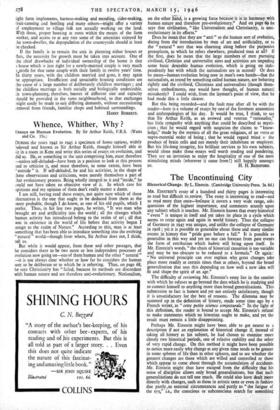Whence, Whither, Why ?
DURING the years 1942 to 1945 a specimen of homo sapiens, widely ',cloyed and known as Sir Arthur Keith, thought himself able to it in a room in Kent and write this series of essays on evolution, and did so. He, or something in the unit comprising him, must therefore —unless self-deluded—have been in a position to look at this process and to criticise it, and must therefore, to some extent, have been ' outside " it. If self-deluded, he and his activities, in the shape of :hese observations and criticisms, were merely themselves a part of :hat evolutionary process. Being wholly integral to it and "inside," he ..muld not have taken an objective view of it. In which case his opinions and my opinion of them don't really matter a damn.
I am still, having read these essays, not quite sure which of these alternatives is the one that ought to be deduced from them as the more probable, though I do know, as one of his old pupils, which I prefer. Thus, in his last two pages, he writes, " It was man who brought art and artificiality into the world ; all the changes which human activity has introduced belong to the realm of art ; all that was in existence in the world of life before that activity began I assign to the realm of Nature." According to this, man is at least something that has been able to introduce something into the evolving natural " world—though from where, Sir Arthur does not, I think, tell us.
But while it would appear, from these and other passages, that he considers there to be two more or less independent processes of evolution now going on—one of them human and the other " natural " —it is not always clear whether or how far he considers the human sort to be deliberate or to which he is referring. Thus, on page 68, he says Christianity has " failed, because its methods are discordant with human nature and are therefore anti-evolutionary. Nationalism, on the other hand, is a growing force because it is in harmony with human nature and therefore pro-evolutionary." And on page 69 he says that civilisation, " like Universalism and Christianity, is anti- evolutionary in its effects."
Does he mean that they are " anti " to the human sort of evolution, dating from the introduction by man of art and artificiality, or to the " natural " sort that was churning along before the purposive protoplasm, to which he refers elsewhere, produced man at all? If the first, does he mean that the large numbers of men pursuing civilised, Christian and univer§alist aims and activities are impeding some basic desirable human evolution, which is going on inde- pendently but with which the nationalists are in accord? Or does he mean—human evolution being now in man's own hands—that the nationalists, as tested by something called human nature, are behaving rightly and the civilised, Christians and universalises (though them- selves embodiments, one would have thought, of human nature) mistakenly? I could wish, from the layman's point of view, that he had made this a little clearer.
But this being recorded—and the fault may after all be with the reader—here is a volume of essays by one of the foremost anatomists and anthropologists of his day. It would be true, I think, to say that Sir Arthur Keith, as an avowed and veteran " rationalist," has little sympathy with anything that could be described as mysti- cism ; that he would regard with suspicion the claims to " know- ledge," made by the mystics of all the great religions, of an extra or supra-material order of being ; that he would regard mind a the product of brain cells and not merely their inhabitant or employer. But his life-long integrity, his brilliant services to his own subjects, would alone make these essays well worth reading and pondering. They are an invitation to enjoy the hospitality of one of the most stimulating minds (wherever it came from!) still happily amongst


























 Previous page
Previous page